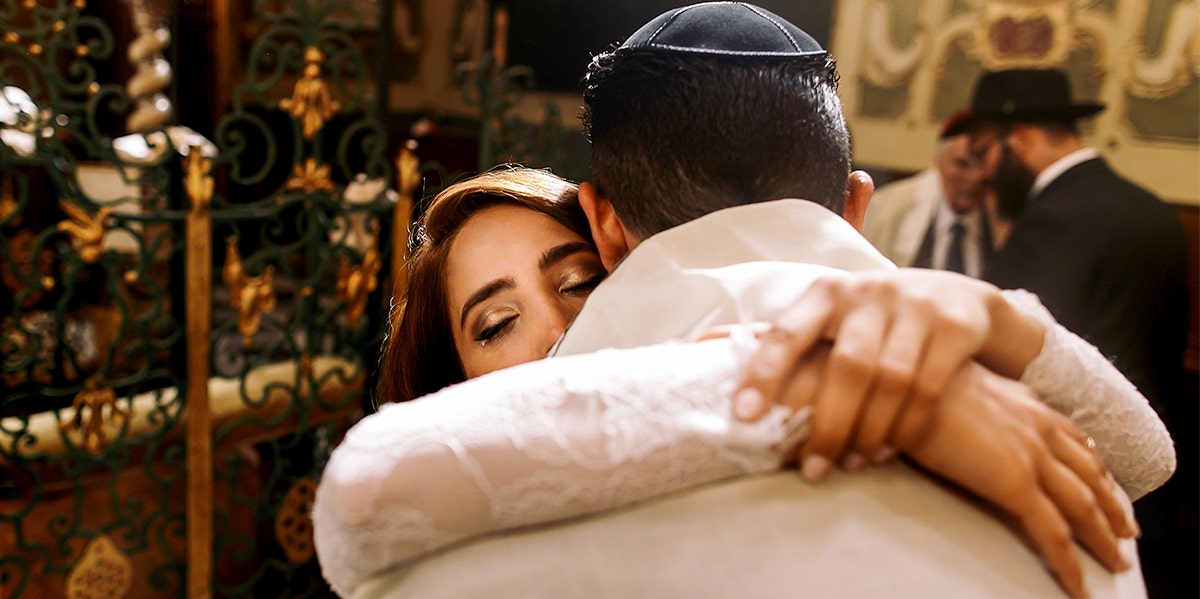I Left Islam And Converted To Judaism — For Love
"I felt so relieved to finally be able to call myself a Jew."
 IVASHstudio / Shutterstock
IVASHstudio / Shutterstock As Told To Marisa Belger
It was during my second month of medical school — as I was cutting anatomy class — that I met Ron. We bonded over our mutual dislike of the subject, and I felt like we had an instant connection.
During the course of that first conversation, we also wound up discussing our backgrounds. Ron, I learned, was Israeli-Jewish. I was Iranian-Muslim.
We quickly fell in love.
Ron proposed a year and a half in, and we planned a Jewish-Persian wedding — where we drank wine, did readings in Hebrew, and let my relatives grind sugar over us to add sweetness to the marriage (according to Iranian/Persian tradition).
The Conversion To Judaism Conversation
Six months after we married, we began discussing the idea of conversion. Ron and I had both been raised in secular homes, and he felt connected to Judaism on a cultural, rather than religious, level.
I, on the other hand, have never really felt tied to Islam. I believe in gay marriage, and I believe that a woman can do anything a man can do. I don’t think there’s a lot of room in Islam for liberal (or even moderate) viewpoints.
With Judaism, I felt like there was still a way for me to be progressive. Though Ron told me early on that he didn’t need me to change religions, I decided I wanted to convert — for love, and for the family we would raise.
Ron and I were going to medical school in New Orleans, so we spoke to a rabbi about the process and began attending services at a Reform temple. At first, I found the commitment tedious. I was in my third (and roughest) year of school, and I had so much work to do. Now I also had to attend conversion classes each evening and services Friday and Saturday — plus, I was pregnant!
Pregnant And Ready
Initially, there were times when I didn’t know if I could handle everything. But as I adjusted to my hectic schedule, my conversion classes became a retreat, in a way, from the day-to-day demands of school and life. They were grounding. And interesting. By the time I was eight months pregnant, I felt ready to convert.
But Hurricane Katrina intervened.
We had to relocate to Houston. And my conversion ceremony, which would have taken place in front of our congregation, wound up being quite private: just me, Ron, two very good Jewish friends, the rabbi, and the cantor from New Orleans.
I felt very connected to each person in the room. I had traveled so far in this journey already: medical school, marriage, pregnancy, the hurricane. And these people had all come to another city, another state, to witness my conversion.
First, came the mikvah — the ritual bath. I disrobed, immersed myself in the water, and prayed. It was very serene — just me and my friend Natalie in the room together. Then I tried to get out, only I was so pregnant she had to help me! (And of course, forgot a towel, so Ron ran off to Target.) After my bath, the rabbi blessed me. It was such a momentous moment: I felt so relieved to finally be able to call myself a Jew.
"You're Not Welcome Here"
Even though I found my religion, at first it was hard to fit in. Ron and I moved to Los Angeles, where there are a lot of Iranian Jews. But they were born that way and don’t usually approve of converts. I went to an Iranian-Jewish website and asked a rabbi if I would be accepted. Because I don’t keep kosher and was a reformed Jew, he said I wasn’t welcome there.
It was a slap in the face.
At first, I was angry and disappointed, but I realized I didn’t convert for acceptance — or to join some sort of club. I converted for my own (and my family's) spiritual development. The most important thing was and is feeling like I was Jewish.
Feeling Accepted
And we found a synagogue that makes me feel that way: It has female rabbis and emphasizes community and continuing education. That was essential to me. Studying the Torah is a lifelong work, and I’m up for it, now that I have a sense of place for me ... and my family.
Dana Stiles is a contributor to YourTango.

